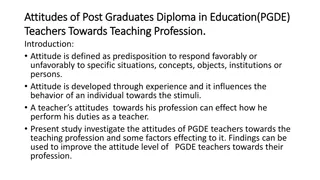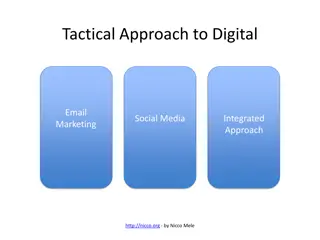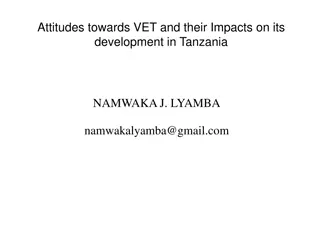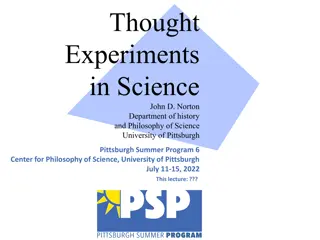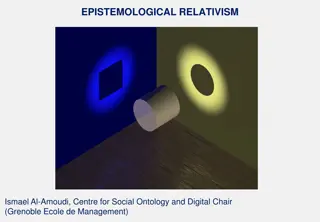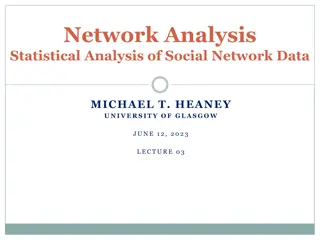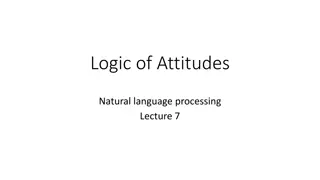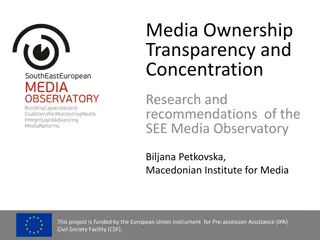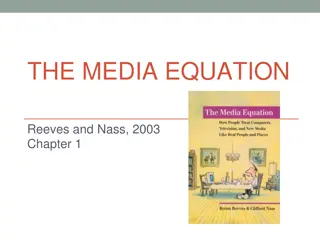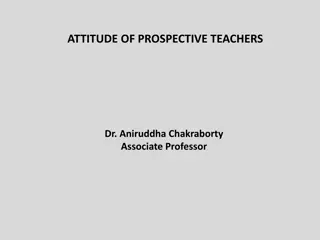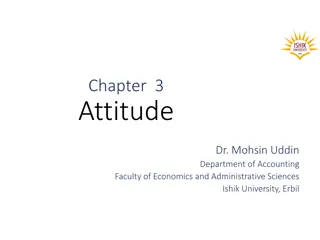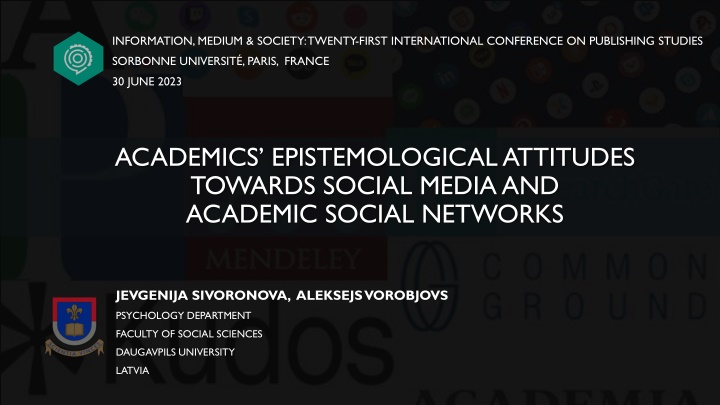
Academics' Perspectives on Social Media and Academic Networks
Explore academics' epistemological attitudes towards social media and academic social networks at the Information, Medium & Society conference. Delve into the significance of various sources of knowledge in academia and the impact of digital media on knowledge production and dissemination.
Download Presentation

Please find below an Image/Link to download the presentation.
The content on the website is provided AS IS for your information and personal use only. It may not be sold, licensed, or shared on other websites without obtaining consent from the author. If you encounter any issues during the download, it is possible that the publisher has removed the file from their server.
You are allowed to download the files provided on this website for personal or commercial use, subject to the condition that they are used lawfully. All files are the property of their respective owners.
The content on the website is provided AS IS for your information and personal use only. It may not be sold, licensed, or shared on other websites without obtaining consent from the author.
E N D
Presentation Transcript
INFORMATION, MEDIUM & SOCIETY: TWENTY-FIRST INTERNATIONAL CONFERENCE ON PUBLISHING STUDIES SORBONNE UNIVERSIT , PARIS, FRANCE 30 JUNE 2023 ACADEMICS EPISTEMOLOGICAL ATTITUDES TOWARDS SOCIAL MEDIA AND ACADEMIC SOCIAL NETWORKS JEVGENIJA SIVORONOVA, ALEKSEJSVOROBJOVS PSYCHOLOGY DEPARTMENT FACULTY OF SOCIAL SCIENCES DAUGAVPILS UNIVERSITY LATVIA
INTRODUCTION SIGNIFICANCE AND POSSIBILITY TO COGNATE Significance of the sources of knowledge in today's informational paradigm informational being. In academia, the quality problem of the sources is crucial because there are many possibilities for how to cognate: Scientific journal articles, scientific monographs and books, university lecturers' knowledge, textbooks and handbooks, popular science magazines and books, academic social networks and social media. Experienced users, academics, assistants, lecturers, senior lecturers, associate professors, professors, or researchers may answer the questions on the sources of knowledge problems.
INTRODUCTION DIGITAL MEDIA Digital media such as social media and academic social networks are platforms for self-expression in everyday and personal life and professional academia, science and research. As producing knowledge, the author is a publisher who presents three dimensions of knowledge simultaneously. These include the product as knowledge, the author spersonality, and the social context in which cognition occurs. Independently of the type of knowledge created, the author is a narrative producer, because the author is motivated by specific cognition, manifesting itself in a particular activity and behaviour and producing knowledge and interpreting, mediating and defining it specifically.
INTRODUCTION VARIETY OF DIGITAL MEDIA There are many different academic and social media networks with different content, services and tools: ACADEMIC SOCIAL NETWORKS (e.g., Research Gate, Academia, Kudos, Mendeley, PhilPapers, Common Ground Research and other similar scholarly media platforms); SOCIAL MEDIA (e.g., Linkedin, Twitter, Telegram, Facebook, Instagram, Reddit, YouTube and other similar digital social media platforms) But how could they be presented as general objects of their classes? How could they be cognized, reflected and valued as general epistemological and social constructs?
INTRODUCTION RESEARCH AIM According to the actuality and importance of this topic, the authors intend to investigate epistemological and psychosocial aspects of social media and academic social networks from an academics perspective. Answering the main research question of how academics value and represent the sources of knowledge, the authors use an interdisciplinary-oriented theory of epistemological attitude which integrates epistemological, personality and social dimensions of knowledge.
Philosophical perspective Ontology FIGURE 1. METHODOLOGY OF EPISTEMOLOGICAL ATTITUDE CONCEPT Epistemology Methodology Holistic constructivism Three aspects of epistemological attitude concept. System of cognition Philosophical, general scientific and specific scientific level of methodology in each modelling step EA concept o Philosophical perspective Philosophical General scientific Specific scientific o Model o Sociopsychological perspective Systemic quality Mechanism of cognition Model
METHODOLOGICAL LEVEL THEORIES AND PRINCIPLES Ontology: Transcendental idealism (Plato 2004; Kant 1999), Subjective idealism (Kant 1999; Fichte 1982), Realism (critical realism, critical ontology) (Bhaskar 2013; Hartmann 2019) Epistemology: epistemological realism, constructive epistemology (Lektorsky 2010; 2018; Putnam 1979; Lenk 2003; Popper 1979) Social epistemology (Goldman 1986; Fuller 2000) Constructivism (Vygotsky 1980, 1987; Berger and Luckmann 2011) Holistic constructivism (Sivoronova and Vorobjovs 2023) Cognition system (Hegel, 2018, 2010; Sivoronova and Vorobjovs 2022) Subject theory (source of activity and cognition, subject of consciousness; subject of cognition; subject of knowledge) Philosophical category of attitude (relation) Phenomenology (Husserl 1983; Wertheimer 1966) Interactionism (Mead 1972) Pragmatism and functionalism (Dewey 2012; James 2000) Philosophical Systems philosophy, systems approach (Von Bertalanffy 2003; Blauberg, Sadovsky and Yudin 1980; Jackson 2013; Nardelli 2022; Mattessich 2012) Systemic quality Systemic principle as functioning; dialectic, complementary and constructive principle General scientific Psychology (social, personality, cognitive, Gestalt theory) and sociology (social epistemology, social constructionism) Attitude concept (meta attitude) Social constructivism (Vygotsky 1980, 1987; Berger and Luckmann 2011, Prawat 1996) Subjective constructivism (Lewin 1967, 1967a; Piaget,1953, 1972; Gibson 2014) Activity principles of personality (Vygotsky 1987; Vorobjovs 1997, 2005) Personalization theory (Petrovsky 2013; Vorobjovs 1997, 2005) Differentiation of personality motivation (Lewin 1967, 1967a) Differentiation of the cognition context Specific scientific
B A FIGURE 3. EPISTEMOLOGICAL ATTITUDE MODEL (A) AND EPISTEMOLOGICAL ATTITUDE TOWARDS SOURCES OF KNOWLEDGE MODEL (B).
EPISTEMOLOGICAL ATTITUDE TOWARDS SOURCES OF KNOWLEDGE MODEL Epistemological approach is the subject s(individual s) methods of formulating and resolving knowledge issues and cognitive activity in the cognition of the source of knowledge. It has 3 scales-categories: optimism, scepticism, and agnosticism. Epistemological approach is the subject s(individual s) methods of formulating and resolving knowledge issues and cognitive activity in the cognition of the source of knowledge. It has 8 scales-categories: criticism, postcriticism, fundamentalism and normativism, rejection of fundamentalism and normativism, subject- centrism, rejection of subject-centrism, science-centrism, and rejection of science-centrism. Context of cognition is the subject s(individual s) characteristics, frequency and intensity of cognition of the source of knowledge and its use in a definite context. It has 8 scales-categories: academic context and personal context. Activity principle of personality in cognition is the subject s (individuals) driving forces and determining factors such as personality and motivational and pragmatic-value aspects in cognition and use of the source of knowledge. It has 3 scales-categories: selection, homeostasis and reduction.
METHOD Participants Academics from different higher institutions in Latvia (N =126) Group 1 (n =66) 33 - 80 years old (M = 50.97 years, SD = 11.53 years) 28 men (42.4%, M = 51.25 years, SD = 11.27 years) and 38 women (57.6%,M = 50.76 years, SD = 11.87 years) Scientific degree: Master 21 (31.8%), PhD 45 (68.2%) Position: 4 assistants, 12 lecturers, 21 senior lecturers, 12 associate professors, 6 professors, 7 researchers, and 4 heads Branch of science: 34 Social Science, 10 Medicine and Health Science, 7 Humannities, and 15 Science Group 2 (n =60) 34 - 72 years old (M = 53.15 years, SD = 10.02 years) 28 men (46.7%, M = 49.93 years, SD = 11.55 years) and 32 women (53.3%,M = 55.97 years, SD = 7.58 years) Scientific degree: Master 20 (33.3%), PhD 40 (66.7%) Position: 2 assistants, 16 lecturers, 25 senior lecturers, 6 associate professors, 3 professors, 2 researchers, and 2 heads Branch of science: 20 Social Science, 3 Medicine and Health Science, 27 Humannities, and 10 Science Data collection: march may 2023 Method Method II Method I Epistemological attitude towards sources of knowldedge semantic questionaire (EASQ) (k=92) Epistemological attitude towards sources of knowledge questionnaire (EAQ) (k=99) = .91 = .89 Target sources of knowledge: 1.- Academic social networks 2. -Social media
METHOD II Measures Method I: EAQ Method II: EASQ Research aim part 1 Research aim part 2 Scale Items in the scale Cronbach s Cronbach s Items in the scale Academics epistemological attitudes towards social media and academic social networks The semantic constructs of the social media and academic social networks Optimism 6 .86 .79 5 Scepticism 6 .85 .80 5 Relevant between 92 categories Agnosticism 16 concepts 5 .79 .72 5 Criticism 6 .80 .60 5 Procedure Post criticism 6 .64 .60 6 Procedure Fundamentalism and normativism Descriptive analysis .70 .57 6 6 92x92 correlation matrix Factor analysis Rejection of fundamentalism and normativism .69 .59 Factor analysis 7 6 Criterion analysis Subject-centrism 5 .63 .70 5 Rejection of subject-centrism .72 .33 5 5 Science-centrism 7 .87 .79 6 Rejection of science-centrism .55 .61 7 6 Academic context 7 .94 .96 7 Personal context 6 .82 .82 5 Selection 8 .87 .80 8 Homeostasis 6 .90 .87 7 Reduction 6 .52 .75 5
RESULTS 1 ACADEMIC SOCIAL NETWORKS Table 1. Construct validity of epistemological attitude towards academic social networks model (factor analysis) Rotated Component Matrix Component 2 -.735 .891 .760 .833 1 3 Optimism Scepticism Agnosticism Criticism Post criticism Fundamentalism and normativism Rejection of fundamentalism and normativism Subject-centrism Components: -.417 1. Context of cognition and Activity principle of personality .804 .685 2. Epistemological strategy .913 .428 .625 .618 3. Epistemological approach .443 Rejection of subject-centrism Science-centrism -.701 .782 Rejection of science-centrism Academic context Personal context Selection Homeostasis Reduction Extraction Method: Principal Component Analysis. Rotation Method: Varimax with Kaiser Normalization. .804 .853 .893 .663 .928
RESULTS 1 SOCIAL MEDIA Table 2. Construct validity of epistemological attitude towards social media model (factor analysis) Rotated Component Matrix Component 2 .537 1 3 Optimism Scepticism Agnosticism Criticism Post criticism Fundamentalism and normativism -.645 .775 .779 .808 -.416 Components: .873 1. Context of cognition and Activity principle of personality .422 -.607 Rejection of fundamentalism and normativism .809 2. Epistemological approach .720 Subject-centrism 3. Epistemological strategy .822 Rejection of subject-centrism -.479 Science-centrism .852 Rejection of science-centrism Academic context Personal context Selection Homeostasis Reduction Extraction Method: Principal Component Analysis. Rotation Method: Varimax with Kaiser Normalization. .783 .889 .887 .882 .905
RESULTS 1 ACADEMIC SOCIAL NETWORKS Table 3. Differences between epistemological attitude scales-categories expressed in mean ranks (Friedman test) Scales Mean Rank Optimism Scepticism Agnosticism Criticism Post criticism 9.95 9.28 4.67 6.30 7.67 Friedman Test Chi-Square = 150.11, p = .000 Fundamentalism and normativism 9.74 Rejection of fundamentalism and normativism Subject-centrism 8.91 9.00 Rejection of subject-centrism Science-centrism 11.83 8.12 Rejection of science-centrism Academic context Personal context Selection Homeostasis Reduction 7.65 8.48 6.05 8.48 11.20 8.68
RESULTS 1 ACADEMIC SOCIAL NETWORKS Mean Rank Median Optimism 12 Reduction Scepticism 10 Homeostasis Agnosticism 8 6 Selection Criticism 4 2 Personal context Post criticism 0 Fundamentalism and normativism Academic context Rejection of fundamentalism and normativism Rejection of science- centrism Figure 4. Academics epistemological attitude towards academic social networks Science-centrism Subject-centrism Rejection of subject- centrism
Table 4. Differences between epistemological attitude scales-categories expressed in mean ranks (Friedman test) RESULTS 1 SOCIAL MEDIA Scales Mean Rank Optimism Scepticism Agnosticism Criticism Post criticism 4.54 13.62 10.27 11.46 9.46 Friedman Test Chi-Square =391.97, p = .000 Fundamentalism and normativism 7.35 Rejection of fundamentalism and normativism Subject-centrism 10.06 11.41 Rejection of subject-centrism Science-centrism 11.42 4.32 Rejection of science-centrism Academic context Personal context Selection Homeostasis Reduction 9.29 2.89 7.61 6.10 7.41 8.79
RESULTS 1 SOCIAL MEDIA Mean Rank Median Optimism 14 Reduction Scepticism 12 Homeostasis Agnosticism 10 8 6 Selection Criticism 4 2 Personal context Post criticism 0 Fundamentalism and normativism Academic context Rejection of fundamentalism and normativism Rejection of science- centrism Figure 5. Academics epistemological attitude towards social media Science-centrism Subject-centrism Rejection of subject- centrism
RESULTS1 ACADEMIC SOCIAL NETWORKS AND SOCIAL MEDIA Table 5. Differences between academics epistemological attitude towards academic social networks and soci la media expressed in mean ranks Mean Rank Academic social networks 86.83 46.14 45.33 47.29 62.77 Scales Chi-Square p Social media Optimism Scepticism Agnosticism Criticism Post criticism Fundamentalism and normativism Rejection of fundamentalism and normativism Subject-centrism Rejection of subject-centrism Science-centrism Rejection of science-centrism Academic context Personal context Selection Homeostasis Reduction 46.17 86.86 87.67 85.71 70.23 37.54 37.63 40.79 33.69 1.27 .000 .000 .000 .000 .259 Kruskal-Wallis Test 83.96 49.04 27.83 .000 65.93 67.07 0.03 .864 57.55 67.72 89.01 65.55 88.23 69.13 81.24 83.34 73.41 75.45 65.28 43.99 67.45 44.77 63.87 51.76 49.66 59.59 7.38 0.14 46.01 0.08 42.88 0.63 19.71 25.77 4.36 .007 .712 .000 .773 .000 .428 .000 .000 .037
Academic Social Networks Social Media Optimism 90 Reduction Scepticism 80 70 Homeostasis Agnosticism 60 50 40 Selection Criticism 30 20 10 Personal context Post criticism 0 Fundamentalism and normativism Academic context Figure 6. Academics epistemological attitude towards academic social networks and social media (mean ranks) Rejection of fundamentalism and normativism Rejection of science-centrism Science-centrism Subject-centrism Rejection of subject-centrism
RESULTS 1I ACADEMIC SOCIAL NETWORKS Figure 7. Semantic construct of academic social networks
RESULTS 1I SOCIAL MEDIA Figure 8. Semantic construct of social media
CONCLUSIONS The research answered the main questions using the epistemological, subjective and contextual scales categories and epistemological attitude concept by creating semantic constructs of social media and academic media networks representing academics' evaluations and constructs of the sources. Theoretical model of epistemological attitude towards social media and academic social networks is validated it showed a three-concept model. Statistically significant differences were found in the academics' epistemological attitude towards academic social networks ( 2 = 150.11, p = .000), according to the comparison of the means rank values of the scales-categories academics evaluated higher the source in optimism, scepticism, fundamentalism and normativism, rejection of subject- centrism, and homeostasis. Statistically significant differences were found in the academics' epistemological attitude towards social media ( 2 = 391.97, p = .000); according to the comparison of the means rank values of the scales-categories academics evaluated higher the source in scepticism, agnosticism, criticism, rejection of fundamentalism and normativism, subject-centrism, and rejection of subject-centrism. Statistically significant differences were found between the academics' epistemological attitude towards academic social networks and social media in eleven scales-categories (p = .000). The means rank values of the scales-categories showed the specific epistemological, subjective and contextual purpose of the cognition of each source. The sources have different values and functions.
CONCLUSIONS The construct or semantic space of the academic social networks revealed two construct dimensions epistemological psychological dimension (with academic orientation) and psychological dimension (with personal orientation). There were identified four quadrants which reflect the four semantic categories and their organisations which make the unique features of the source 1) high epistemological value inter- and meta- level which is realised in practice; 2) features based on meta-knowledge level highly scientific and theoretical; 3) epistemologically sceptical features or underestimated; and 4) intra- and inter- knowledge with high psychological and action value and at the same time ignorant towards epistemological ones. The construct or semantic space of the media revealed two construct dimensions epistemological (with postclassical orientation) and psychological. There were identified four quadrants which reflect the unique features of the source 1) features based on inter-knowledge with added epistemological value; 2) features based on intra and inter-knowledge with personally practical value as a priority; 3) epistemological scepticism and criticism; 4) feature based on postclassical epistemological value as meta-knowledge. Research results could also aid the authors and academic and social community in rethinking and re- evaluating the content and functions of academic social networks and social media, specifically, the creation and transfer of knowledge and its influence of it.
EPISTEMOLOGICAL ATTITUDE QUESTIONNAIRE TOWARDS SOURCES OF KNOWLEDGE Dear colleagues, You are kindly invited to participate in the questionnaire of university lecturers and researchers. The questionnaire was created on the Google Forms site, allowing you to evaluate the sources at a time that suits you and fill it in parts, thanks to the successful option of Google Forms, which saves the evaluation process. Please pay attention to the detailed instructions, which describe the evaluation procedure. Each evaluated criterion requires your attention, an individually scientific and personal approach, so it would be better to evaluate the sources of knowledge slowly and without haste, in your free time, in-depth and with interest. Thank you for your response! Your evaluations have high scientific and practical value!
ACKNOWLEDGEMENT Implementation of the study was supported by the ESF Project No. 8.2.2.0/20/I/003 Strengthening of Professional Competence of Daugavpils University Academic Personnel of Strategic Specialization Branches 3rd Call .
REFERENCES Berger, Peter L., and Thomas Luckmann. 2011. The Social Construction of Reality: A Treatise in the Sociology of Knowledge. Open Road Media. Bhaskar, Roy. 2013. A Realist Theory of Science. Routledge Blauberg, Igor V., Sadovsky, Vadim N., and Yudin, Erik G. 1980. Systems Theory: Philosophical and Methodological Problems. Science and Society 44 (4): 490 92. Dewey, John. 2012. Essays in Experimental Logic. Courier Corporation. Fichte, J. G. 1982. The Science of Knowledge: With the First and Second Introductions. Cambridge University Press. Fuller, Steve. 2000. Social Epistemology: A Philosophy for Sociology or a Sociology of Philosophy? Sociology, August. https://doi.org/10.1177/s0038038500000353. Gibson, James J. 2014. The Ecological Approach to Visual Perception: Classic Edition. Psychology Press. Goldman, Alvin I. 1986. Epistemology and Cognition. Harvard University Press. Hartmann, Nicolai. 2019. Ontology: Laying the Foundations. Walter de Gruyter GmbH & Co KG. Hegel, Georg Wilhelm Fredrich. 2010. Georg Wilhelm Friedrich Hegel: The Science of Logic. Cambridge University Press. Hegel, Georg Wilhelm Fredrich. 2018. Georg Wilhelm Friedrich Hegel: The Phenomenology of Spirit. Cambridge University Press. Husserl, Edmund. 1983. Ideas Pertaining to a Pure Phenomenology and to a Phenomenological Philosophy: First Book: General Introduction to a Pure Phenomenology. Springer Science & Business Media. Jackson, Michael C. 2013. Systems Methodology for the Management Sciences. Springer Science & Business Media. James, William. 2000. Pragmatism and Other Writings. Penguin. Kant, Immanuel. 1998. Critique of Pure Reason. Cambridge University Press. Lektorskii, Vladislav. 2010. Realism, Antirealism, Constructivism, and Constructive Realism in Contemporary Epistemology and Science. Journal of Russian and East European Psychology 48 (6): 5 44. https://doi.org/10.2753/rpo1061-0405480601. Lektorsky, Vladislav. 2018. Constructive Realism as the Contemporary Form of Epistemological Realism. Philosophy of Science and Technology 23. https://doi.org/10.21146/2413-9084-2018-23-2-18-22.
REFERENCES Lenk, Hans. 2003. Grasping Reality: An Interpretation-Realistic Epistemology. World Scientific. Lewin, Kurt. 1967. Field Theory in Social Science: Sel. Theoret. Papers. Lewin, Kurt. 1967a. A Dynamic Theory of Personality: Selected Papers. Mattessich, Richard. 2012. Instrumental Reasoning and Systems Methodology: An Epistemology of the Applied and Social Sciences. Springer Science & Business Media. Mead, George H. 1972. The Philosophy of the Act. The University of Chicago press. Nardelli, Pedro H. J. 2022. Cyber-Physical Systems: Theory, Methodology, and Applications. John Wiley & Sons. Piaget, Jean. 1953. Logic and Psychology. Piaget, Jean. 1972. Psychology and Epistemology: Towards a Theory of Knowledge. Plato. 2004. Plato s Theaetetus. Focus. Popper, Karl Raimund. 1979. Objective Knowledge: An Evolutionary Approach. Oxford University Press. Prawat, Richard S. 1996. Constructivisms, Modern and Postmodern. Educational Psychologist 31 (3 4): 215 25. https://doi.org/10.1080/00461520.1996.9653268. Putnam, Hilary. 1979. Philosophical Papers: Volume 2, Mind, Language and Reality. Cambridge University Press. Sivoronova, Jevgenija, and Aleksejs Vorobjovs. 2022. Epistemological Attitude in the Cognition System: Holistic Constructivist Approach. Conference Paper. https://thesocialsciences.com/2022- conference. Athens, Greece. Sivoronova, Jevgenija, and Aleksejs Vorobjovs. 2023. Academics Epistemological Attitude Towards Sources of Knowledge Questionnaire. Paper presentation. Lisbon, Portugal. https://inpact- psychologyconference.org/. Von Bertalanffy, Ludwig. 2003. General System Theory: Foundations, Development, Applications. New York: G. Braziller. Vorobjovs, Aleksejs. 1997. Personology: Personality and Activity Problem. Daugavpils University. (In Russian) Vorobjovs, Aleksejs. 2005. Theoretical Aspects of Social Psychology. Riga: Izgl t bas so i. (In Latvian). Vygotsky, Lev. 1980. Mind in Society: The Development of Higher Psychological Processes. Harvard University Press. Vygotsky, Lev. 1987. The Collected Works of L.S. Vygotsky: Volume 1: Problems of General Psychology, Including the Volume Thinking and Speech. Springer Science & Business Media. Wertheimer, Max. 1966. Productive Thinking.
THANK YOU FOR YOUR ATTENTION! If you have any questions, or wish to collaborate, please email jevgenija.sivoronova@du.lv









